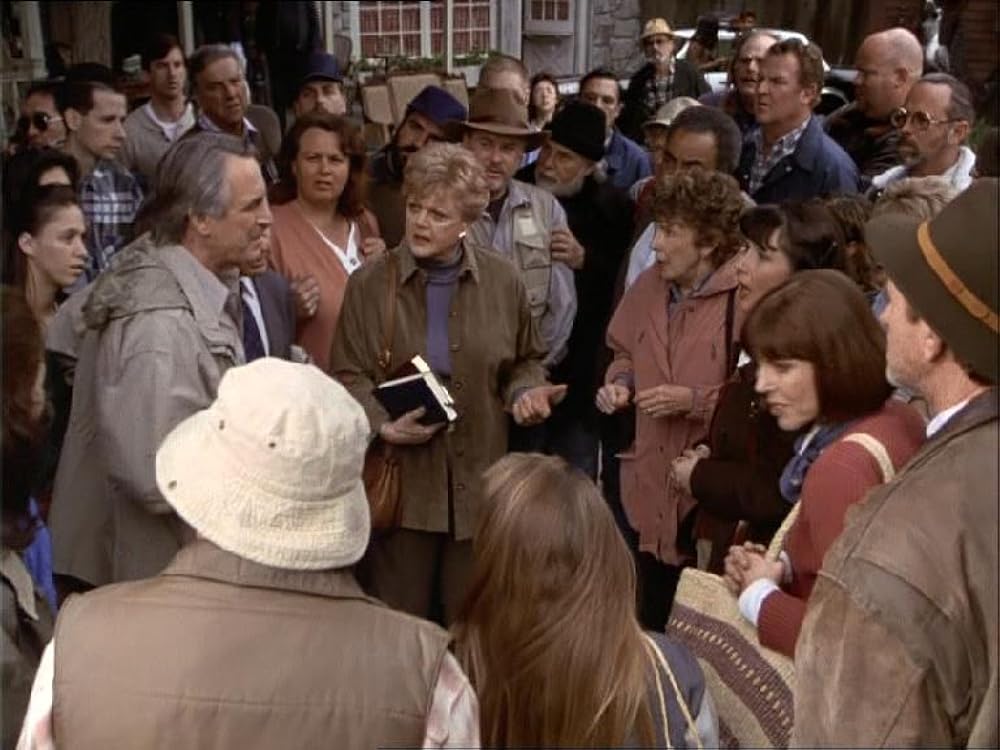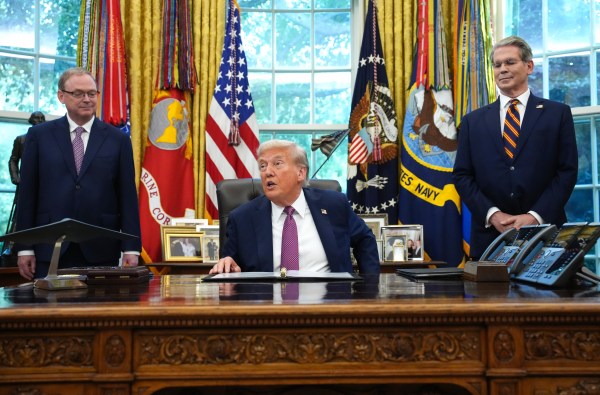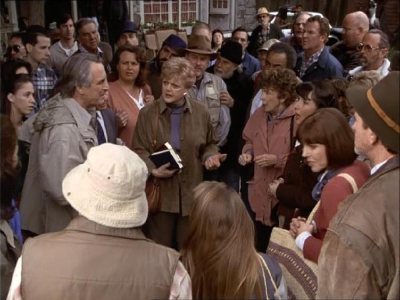For a guilty pleasure or just pure comfort, it’s hard to beat 1980s television, and even harder to surpass shows like Murder, She Wrote. The charm of Jessica Fletcher, an English teacher-turned-mystery-writer-turned-amateur-sleuth lies in her capacity to care for an extensive network of nieces, nephews, and old friends—who are all suspected of murder at alarming rates. But that same care allows Fletcher to see the human beneath even the most vile of people. It creates a character who, though fictional, embodies what it means to be “civil” or, as Alexandra Hudson defines it in her new book The Soul of Civility: Timeless Principles to Heal Society and Ourselves, to see and engage with the humanity within both friends and enemies.
Like Murder, She Wrote, civility is timeless and, at first glance, a little old-fashioned. Hudson embraces the term and explores its history in the book, from ancient scrolls to our own doomscrolling times. The content will be familiar to those who also subscribe to Hudson’s newsletter, “Civic Renaissance,” which ties thinkers from a long literary and theological tradition to modern-day crises. Hudson maintains a journalistic, if occasionally flowery, style, peppered with personal stories and dry humor. The result is a book informed by years of research, but which occasionally tells the reader more about the author than the subject.
Hudson describes her book as “an extended reflection on the question of how to harmoniously coexist with our fellow human beings.” This is the titular “soul of civility,” a concept Hudson traces back to the life of Ptahhotep, a political adviser in Ancient Egypt and the author of the world’s oldest book, The Maxims of Ptahhotep. Hudson summarizes his advice as follows: “We must combat our innate self-love, care for those in need, and show humanity to our friends and enemies alike.” This is the touchstone of human society but, as we know, it can be exceptionally difficult to put into practice.
On its face, civility seems synonymous with being nice, but Hudson rejects this equivalence. Niceness feels easy enough—until you hear something transgressive about politics, social justice, gender and sexual identity, religion, etc. Suddenly, being nice feels far less important than standing up for the right view, whether you are arguing with the government or with your Aunt Linda on Thanksgiving. Civility, by contrast, entails “the disposition that comes from seeing all people as they really are: beings with an innate dignity,” writes Hudson. “It is only by embracing this disposition that we can live a good life.” Embracing this disposition means choosing to engage in a discussion rather than writing off your opponent, and engaging in a way that recognizes the other person’s dignity, even if you ultimately disagree. Niceness demands a smile-and-nod; civility requires taking opponents’ “ideas seriously, and that sometimes requires forceful and robust argumentation.”
This understanding of civility can feel antithetical to the modern American cultural demand for quick, decisive reactions to complex issues. Social media has only furthered this tendency: Weigh in too quickly on an issue and you may miss some of the facts, but take too long on an Instagram story or X post and you will read as performative or miss the boat entirely. The more political the topic, the harder it is to practice civility toward someone you disagree with. And our political addiction amplifies our “tendency to dehumanize those with different views of justice.”
The solution for Hudson involves “[desaturating] our lives of politics.” How? By taking a step back from the horse race and controversies, and instead filling your life with other human goods: intellectual curiosity, friendship, beauty, to name a few. Curiosity, Hudson argues, “helps us recognize that we don’t have all the answers.” Friendship helps us to “unbundle” people and resist “the urge to essentialize and define others based on one aspect of who they are.” Beauty grounds our perspective and “connects us with the sublime,” which Hudson defines as experiences that remind us of our fragility. A friendly audience will find these alternatives persuasive, but it may appear more trite than profound to those who find their existential identity depending on the political climate.
Not only are we addicted to politics, but our consumer-centric culture seeps into our relationships. Hudson writes, “Our consumerist and capitalistic society conditions us to apply a consumer mindset to all relationships in our lives, viewing others in terms of what we can get from them, and walking away when our needs are not met.” This attitude idolizes the self above all else. She doesn’t think we should stay in bad relationships—whether romantic, amical, or familial—but rather that we should view people as valuable in and of themselves, not as a means to some gain.
Professional networking exemplifies interactions ruled by this utilitarian attitude, as well as interactions that are governed by “politeness,” another common distractor from civility. Hudson explores the distinction by drawing on her own experience in Washington politics. She writes, “When I moved to Washington, DC, and took a job in politics, my confidence in politeness was shaken. I discovered that those who survived and succeeded in Washington often did so with two tactics: punishing ruthlessness or extreme politesse.” Politeness does not guarantee civility; it is a set of rules that can be used to deceive. Civility, in contrast, is an attitude and an exercise in self-control to refrain from a full-blown pursuit of our own self-interest, that allows us to live in harmony with others and cannot be replaced by any rules of etiquette.
In the first half of the Soul of Civility, Hudson traces the concept in advice that, she writes, “rather remarkably appears and reappears in similar manuals and philosophical reflections on good living across human history.” She writes about the lack of civility in historical oppression, including colonization and slavery, as well as how civility, as the equal worth and dignity of all persons, served as the touchstone for arguments for emancipation and the civil rights movement. Each of these movements towards a more just society required seeing marginalized people as having the same inherent value of those with historical privilege.
As is the nature of many historical surveys, Hudson spends more time recounting the views of people in the past than developing her own unique insight. The sheer number of references, stories, and quotes can be more overwhelming than helpful. For example, she traces the importance of hospitality—particularly the kind shown to strangers—from Homer’s The Odyssey to Roger Williams’ refuge with the Narragansett tribe to Hudson’s trip to Ireland. She also references A Thousand and One Nights, more Greek mythology, customs in India and Nepal, Hebrew and Latin etymology, and her own move to Indiana. While Hudson successfully argues that hospitality “confronts us with the beauty of personhood and community, which makes it easier to overcome our selfishness so our social nature can thrive,” the various historical vignettes throughout the book distract from her real strength: cultural insight.
In addition to her historical and cultural analysis, Hudson encourages the reader to take steps toward rebuilding civility in an uncivil society. Each chapter includes examples of actions like: “It may feel like a stretch, but try inviting someone into your home. Again, start small and build. The home is an intimate, beautiful, fertile ground for friendship.” She also recommends programs like Braver Angels, a nonprofit that runs debate programs on college campuses and in local communities so that participants can talk about challenging issues, and Great Hearts Academies, a classical charter school network, as potential solutions to incivility. It’s an admirable impulse, but I wonder whether most of the audience for The Soul of Civility already engages with their community in the ways Hudson recommends.
Hudson clearly cares deeply about American culture, and she deftly captures the difficulty of controlling one’s own self-interest and seeing the humanity in others. The book can feel like it is trying to accomplish too much in a historical overview, action items, and philosophical musings in one sitting, but Hudson’s analysis is both insightful and needed. No, there are no easy solutions to incivility as there are in detective dramas—no cocktail party where the perpetrator is identified and handed over to the courts of justice. Instead, the solution lies in the same place as the problem: in everyday people choosing to put aside our own prejudices and self-centeredness and treating others with dignity and care.






Please note that we at The Dispatch hold ourselves, our work, and our commenters to a higher standard than other places on the internet. We welcome comments that foster genuine debate or discussion—including comments critical of us or our work—but responses that include ad hominem attacks on fellow Dispatch members or are intended to stoke fear and anger may be moderated.
With your membership, you only have the ability to comment on The Morning Dispatch articles. Consider upgrading to join the conversation everywhere.